By Melanie Nathan, September 14, 2012.
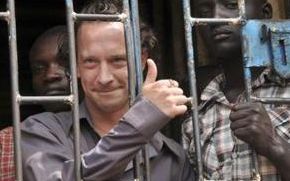 David Cecil, the British producer of a play in Uganda is in jail pending trial on charges that he had staged a play performed without official authorization. Cecil appeared in court Thursday charged with ‘‘disobeying lawful orders’’ from the Uganda Media Council, which says he staged ‘‘The River and the Mountain’’ in Uganda’s capital last month despite orders to the contrary.
David Cecil, the British producer of a play in Uganda is in jail pending trial on charges that he had staged a play performed without official authorization. Cecil appeared in court Thursday charged with ‘‘disobeying lawful orders’’ from the Uganda Media Council, which says he staged ‘‘The River and the Mountain’’ in Uganda’s capital last month despite orders to the contrary.
Cecil’s lawyer, Francis Onyango, said his client was not released on bail because his passport, wanted by the magistrate, had been confiscated by the polic.
Cecil recently produced and staged this play, Uganda’s first theatrical production to feature a gay protagonist, The River and the Mountain. The play does not depict a gay rights-based message but rather embeds a gay (Kuchu) hero within a wider drama about corruption, religion and politics. Cecil told me in a recent interview that the script went through an approval process by the National Theatre of Uganda.
If the Uganda media council had had its way, The River and the Mountain would not have been performed in Uganda at all, but it played to sold out audiences. However now there seems to be some confusion. Cecil told me in a month ago in an interview that the play had at first been approved for viewing. It is a play about sexuality, politics and religion; so they wanted to ban it after it had been shown in small theaters eight times.
The River and the Mountainwas written by Beau Hopkins, produced by David Cecil and directed by the BBC award winning Angella Emurwon.
The themes are desperation, betrayal, manipulation, self-betrayal, intolerance and the use of Christianity to spread hate instead of compassion.
The play asks the provocative question – ” Can’t you be straight for me? ” by the journalist character, Samson. It is widely assumed that sexuality can be turned on and off like a switch.
In the interview with Cecil I warned him about retaliation for this play influenced by increasingly frustrated Member of Parliament, David Bahati and Minister of Ethics Simon Lokodo, who are desperate to see passage of the Anti-homosexuality Bill. Cecil did not seem to think he would be arrested for producing the play.
He wanted to believe that Ugandan society was indeed headed toward tolerance, notwithstanding political forces that were trying still to pass the languishing “Kill the Gays Bill” that would criminalize the so called “promotion of homosexuality.”
He noted the possible positive attributes of Ugandan society pertaining to a climate that could possibly become tolerant, including the popularity of the play and the recent gay pride parade.
While “acts against nature” are illegal in Uganda with its wide definition seeming to include homosexuality, the new Bill, if passed, will subject any so called “promoter” of homosexuality to arrest. While such has yet to pass, Cecil’s arrest may have been ordered under other laws yet because of this principal.
While hoping his play could bring some understanding in Uganda, the fact that none of the cast and crew are themselves gay which Cecil touts as significant: “what has happened to the unquestionable consensus touted by the Anti-Gay politicians?” Cecil asks. Yet, it is apparently now clear that these politicians called for the arrest to silence David Cecil.
In a milieu of scape-goating, one can only wonder if it the gay subplot in the play is the ‘true offender ‘or if it is an excuse by Ugandan authorities to retaliate for all the questions raised by the play including that of corruption and poverty.
Cecil was excited when he called me from Kampala, mere days after the play was first staged. I tried to warn him, without tempering his exuberance. The play had been a huge success and that was something Ugandan authorities would probably not tolerate.
He noted “the fact that club-owners, shop-owners, theatres, the press, artists, businessmen, local authorities and even some pastors are opening up to the idea of a gay community in Uganda shows just how wrong the hate-mongers were, ” he told me in the interview. But that is precisely what Ugandan authorities fear.
Cecil may have miscalculated and underestimated the forced of anti-gay hate in Uganda. He is now in danger and as a straight ally must receive our international support. However we tread a fine line here – while we must support and advocate for the immediate release of Cecil, in the name of free speech and media, we must be aware of possible backlash against Cecil, his family and the gay community in general.
SIGN PETITION TO FREE DAVID CECIL http://www.avaaz.org/en/petition/Uganda_Free_British_Play_Producer_David_Cecil/?cTPXwbb
——————————————————————————————
THE PLAY that sent David Cecil to Jail
The River and the Mountain
Characters:
Samson, late 20s
Olu, Samson’s best friend, late 20s
Tegume, Samson’s boss, 40s
Karen, Tegume’s wife, 30s
Aida, a journalist, mid 20s
Margaret, Samson’s mother, 50s
Chorus of 5:
factory workers
church congregation
etc
ACT 1
Samson is a senior manager at Bebo Industries Inc, a company with a factory in Kampala producing cooking oil. He’s honest, hard-working, intelligent and eloquent. But he has a problem: he’s being blackmailed. The factory workers are striking over a recent pay cut, and Tegume, the managing director, wants to use force and teach them a lesson. All he needs from Samson are the names of the main agitators: he’ll send his private security boys over to their houses, beat them to a pulp and intimidate their families. If Samson delivers the names, he’ll get a promotion and become next in line to succeed him as MD; if he doesn’t, he’ll be fired. Despite Samson’s protestations that such violence would be immoral and counterproductive, Tegume refuses to budge: it’s do or die. Samson’s best friend from childhood, Olu, a famous singer with aims of becoming a pastor, advises him to turn the ringleaders over and take the promotion: it’s the opportunity of a lifetime, and once in a senior position he’ll be able to do more good for the other workers. Olu’s also concerned that Samson’s been working too hard and neglecting his love life. He sets him up on a date with Aida, an ambitious young journalist. During the date, Aida senses that something’s troubling Samson. He tells her about the situation at work, and she suggests a way out: she’ll publish a story about the strike, without mentioning Samson as the source. Samson agrees. The story is published and becomes a huge scandal. Tegume is forced to resign and promotes Samson to MD. The workers are delighted and the strikes end. Samson celebrates with Olu in a pool bar, where a group of friends play a regular tournament. Amidst the euphoria, Samson decides to make a confession to Olu. This, he tells him, is the great secret of his life: he’s gay. Someone then calls Samson back to the pool table, leaving Olu troubled and disturbed by his revelation.
ACT 2
In the meantime, Samson has confessed his sexuality to his mother, Margaret. He humors her attempts to have him ‘healed’, first at church, then by a senga, then by a witchdoctor. Nothing works, and Margaret reluctantly resigns herself to his homosexuality. Out on another date with Aida, who has also gained some fame on the back of the factory story, Samson decides he can’t allow the charade to go on any longer. He tells Aida he’s gay. To his surprise and relief, she finds the whole situation hilarious. Later, when the pair meet with Olu and other friends, the conversation veers onto the subject of homosexuality. Samson stays quiet as one or two others make homophobic jokes and comments. Aida berates them for their insensitivity, but Olu says nothing. Once the others go, Samson confronts Olu about it. It becomes clear that Olu’s faith and religious fervour make it difficult for him to accept Samson, and their friendship has begun to break.
Tegume, meanwhile, is living with the shame of his resignation, which his ferocious wife Karen, a pastor with a large church, won’t let him forget. But when Tegume tells Karen of a rumor going round that Samson’s gay, she gets an idea that could shoot him, and her, to wealth and power. She suggests they launch a campaign to vilify homosexuality; and the best way to popularize the movement would be with a song. Soon after, Tegume approaches Olu, asking him to pen an anti-gay song; in return, Karen will make him pastor of a large church.
At the factory, unrest has sprung up again. Samson realizes that as much as he wants to restore the workers’ wages, he can’t: Tegume was right that there wasn’t enough money. International competition is forcing prices down and depressing wages. But Samson comes up with an idea that wins the workers over: instead of raising wages, he’ll give the workers stock in the company. That way, they’ll all be involved in the success or failure of the company. The strategy is a huge success, and stock-option schemes spring up all over the country. On the back of this, Samson becomes an advisor to the President on industrial relations.
But his fortunes are about to change. Dejected by Samson’s fame and success, and his own failure to become a pastor, Olu meets with Tegume and a pair of American evangelists backing his anti-gay campaign, which Karen has dubbed the Families First Movement. Olu agrees to write the song.
ACT 3
Olu’s song, ‘Not Today’, has become a huge success. The whole of Kampala knows it off by heart. Tegume and Karen’s campaign is becoming a mass movement, and pastors, politicians, everyone wants to be associated with it. Olu is given his own church.
Samson naturally is deeply disturbed by the unfolding events. On top of that, profits at Bebo Industries Inc are falling, and the company’s in danger. Then Tegume, who has by now won an appointment from the government as an Inspector of Public Morals, visits Samson and makes him a deal. He tells Samson he wants his company back: Samson will have to resign or Tegume will out him to the workers and the whole of Kampala. Tegume is not without sympathy for Samson’s dilemma, but, he says, that’s just the way things are. Olu arrives to encourage Samson to resign. Disgusted by his friend’s betrayal, Samson throws him out.
Samson confides in Aida. He knows that Tegume will expose him no matter what, so his plan is to tell his own workers that he’s gay. But Aida has a different idea: she suggests he give an exclusive interview to her news station, explaining himself and making a principled stand for decency and tolerance against the hatred and the increasingly violent rhetoric of the Families First Movement. Samson gives the interview. But while he attracts the sympathy and admiration of a few, he wins the hatred and disgust of the many. He’s quickly stripped of his government post. Olu himself publicly condemns Samson and even visits the factory to stir the workers up against him. Things are now becoming dangerous for Samson. Already there has been some anti-gay violence in Kampala, and some of the workers, incensed by the interview and stoked by Olu, vow to murder their boss.
Samson returns to the factory to do some last minute accounts. He plays one last game of chess with the night guard, and for once the guard wins. Knowing that there may be trouble, he dismisses the guard. He then gets a final visit from Olu, now wracked with guilt, who warns him to leave – people are on their way to harm him. Samson refuses and Olu leaves. As night falls, the workers arrive with their pangas. Samson has time to utter a few words before he’s killed.
AP Photo screen shot
Related articles
- Watch Ugandan Gay Activist Frank Mugisha Debate Gay- Hating Evangelical Scott Lively (oblogdeeoblogda.me)
- Ugandan Gay Pride a Great Success (oblogdeeoblogda.me)
- Uganda Gay LGBT Groups Vehemently Condemn the Anonymous Hack of Ugandan Government Sites (oblogdeeoblogda.me)
- Brit Producer of Gay Play in Uganda Held in Jail (abcnews.go.com)
- Prison possible for British producer of ‘gay’ Uganda play (76crimes.com)





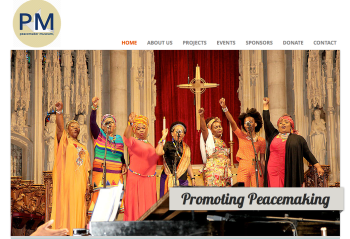




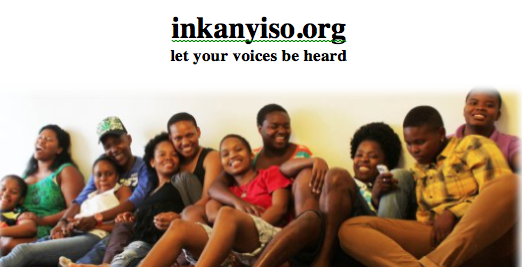







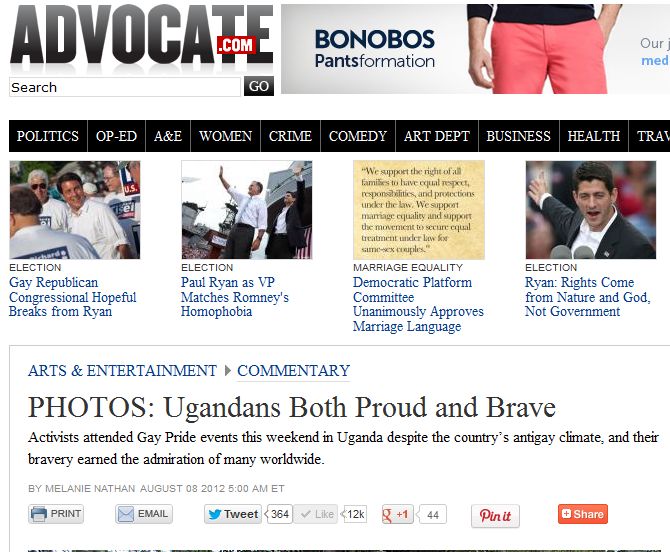
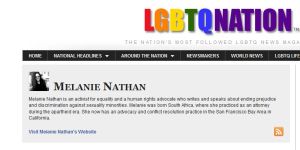
 PoochParkWear customizes hoodies and t-shirts, the good, the naughty, the in between, whether proud or quirky let them be seen. We also offer biker jackets, croc or pleather collars, a variety of collar charms, and our special Zinja beaded collars made by a co-op of HIV-positive South African women, the Sisonke women who weave the beads onto the collars.
PoochParkWear customizes hoodies and t-shirts, the good, the naughty, the in between, whether proud or quirky let them be seen. We also offer biker jackets, croc or pleather collars, a variety of collar charms, and our special Zinja beaded collars made by a co-op of HIV-positive South African women, the Sisonke women who weave the beads onto the collars.

Very clever move by Mr. Cecil. It’ll force the UK/EU to take a stronger stance against Uganda’s anti-gay movement.
Yes, I am thinking of a petition – but controlling and changing the message – perhaps to be less about gay and more about censorship in general. That is the best way to align Ugandans generally against this move. To tackle it from the censorship of media perspective. Which impacts ALL Ugandans and not just those interested in LGBTI rights as a human rights issue. I think I am going to write another article utilizing that interpretation of these events.
I find it sad and almost embarrassing that the injection of evangelical christianity into other cultures and faiths almost guarantees a rise in homophobia and bigotry.This happened in native culture as well, where prior to the injection of christianity gay people were common and referred to as “two-spirit” and considered almsot sacred, but with the injection of christianity came the bigotry and homophobia. When I read the words “The themes are desperation, betrayal, manipulation, self-betrayal, intolerance and the use of christianity to spread hate instead of compassion” I think this could be about America. I’d like to say on behalf of the millions of christians quielty practicing their faith according to Jesus’ example that homophobia,hate and bigotry are NOT the values of a real christian, simply the deflections of an insecure soul and I’m for one sorry.